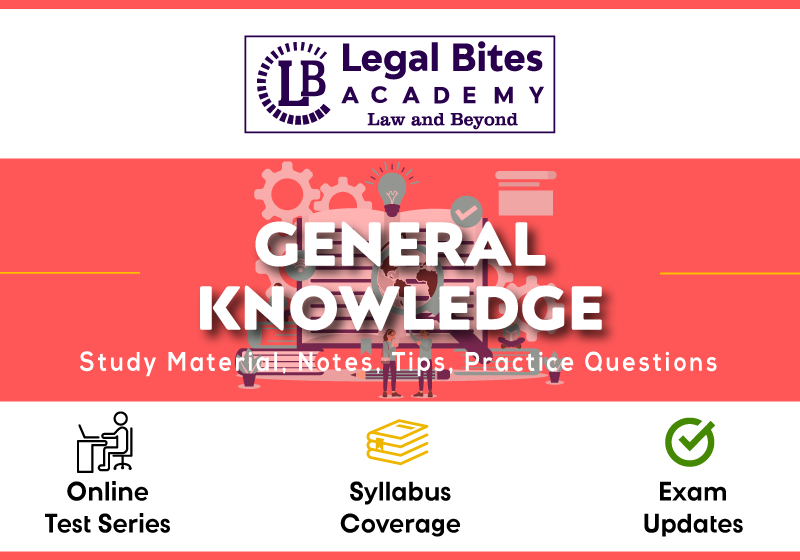How to approach Current Affairs including GK section of the CLAT UG
How to approach the Current Affairs and GK section of CLAT is what most aspirants appearing for CLAT worry about. This section is one of the least time-consuming sections of the paper since the questions are mostly fact-based and direct. The candidate’s awareness related to events around the world is tested more than the analytical skills as it… Read More »

How to approach the Current Affairs and GK section of CLAT is what most aspirants appearing for CLAT worry about. This section is one of the least time-consuming sections of the paper since the questions are mostly fact-based and direct. The candidate’s awareness related to events around the world is tested more than the analytical skills as it reflects how aware the candidate is which is important in legal education. This section tests the candidate’s memory more than...
How to approach the Current Affairs and GK section of CLAT is what most aspirants appearing for CLAT worry about. This section is one of the least time-consuming sections of the paper since the questions are mostly fact-based and direct. The candidate’s awareness related to events around the world is tested more than the analytical skills as it reflects how aware the candidate is which is important in legal education.
This section tests the candidate’s memory more than the evaluation skills hence the candidate will be expected to be up to date with the current affairs and events happening around the world. This section will give you a better understanding of how to approach questions in Current Affairs including the General Knowledge section of the UG CLAT 2021. Read each point carefully:
Forms of Questions
You can expect Current Affairs and General Knowledge section to include questions that ask you to:
- Fill in missing information in the blanks.
- Identify the causes and consequences of the events described in the passages.
- Answer questions about personalities and events associated with the passage.
- Answer questions about awards, recognition, and other events of significance associated with persons mentioned in the passage.
- Ask about laws and other events of legal significance (such as judgments) associated with the events mentioned in the passage.
How to approach questions
- Passages are about 450 words each.
- Passages may be from news, journalistic sources, and other non-fiction writing.
- Questions are intended to test the depth of understanding of issues and events of significance, rather than mere fact- or trivia-based superficial knowledge.
- While the focus is on more recent and current events, questions may test you on historical information related to such events and significance, in order to better gauge your understanding of the causes of such current events.
- Questions may also relate to matters associated with the events mentioned in the passage – for a passage about a natural calamity, for example, you may face questions not only about that natural calamity, but similar events in other parts of the world.
- The purpose of this section is to test not individual standalone facts, which by themselves have no value but to be able to be curious about and see the universe of facts within which an individual situation manifest. For instance: If there is a question on forest fires in the Amazon the CLAT will like you to be curious about forest fires, about the Amazons, about international climate change policy, about Brazil, and so on. All of these to see how facts come together to construct the world around us, a fundamental skill for any lawyer.
- Make sure you read the entire passage before you attempt the questions – while the answers to some questions may seem apparent to you, you would be able to pick up valuable clues about the answers to other questions by ensuring you read the entire passage first.
- Don’t worry about whether you will remember all the elements of the passage when you come to the questions – the idea is not to test your ability to memorize the passage and answer questions that test your recollection – but do make sure you have a good idea of the overall theme or point of focus of the passage, as this may help jog your memory about any related information you may have read or come across in your preparations.
- In line with the overall theme of the UG CLAT 2021, the focus is on comprehension, and your ability to understand and decode the information set out in the passage. While you may not be asked vocabulary questions in this section of the paper, you may be asked the meaning of certain statements made in the passage, insofar as they relate to information associated with such statements – for example, a passage relating to cyclones may ask you what the difference is between a cyclone, typhoon, and hurricane.
- As with all the other sections of the UG CLAT 2021, make sure you pay close attention to the wording of the questions – the question setters may be examining your ability to read and follow the text closely, and so, may frame questions in a negative manner (e.g., Which of the following is not an example of x?) or may use a double negative as well (e.g., Instead of asking which of the following is an efficient way to do x, the question may be framed as Which of the following is not an inefficient way to do x.)
Source: Official Website – Consortium of National Law Universities, Available Here
Admin Legal Bites
Legal Bites Study Materials correspond to what is taught in law schools and what is tested in competitive exams. It pledges to offer a competitive advantage, prepare for tests, and save a lot of money.

